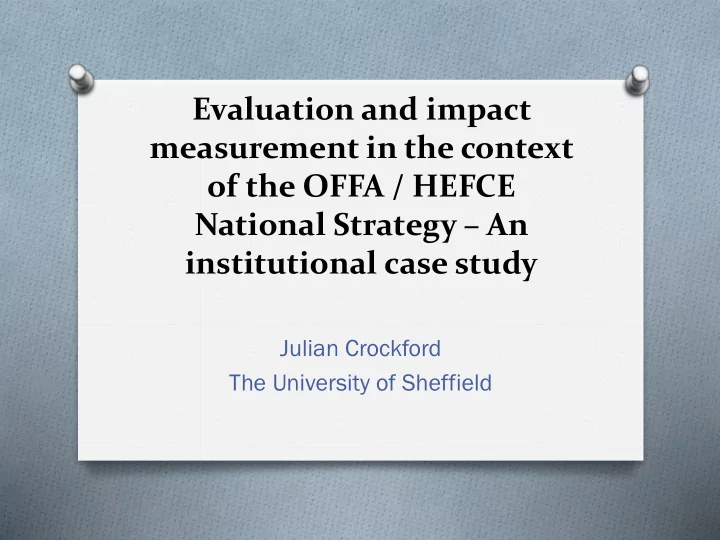

Evaluation and impact measurement in the context of the OFFA / HEFCE National Strategy – An institutional case study Julian Crockford The University of Sheffield
BIS National Strategy for Access and Student Success O Whole lifecycle approach O Partnership / collaborative learning NNCOs O National evaluation framework O Co-ordinating national research O O Evidence-based practice “Institutions must be able to demonstrate that the widening access and student success activities they undertake are worthwhile and effective . This principle applies both to public funding, and to institutions’ expenditure through agreements with OFFA: there must be convincing evidence of value for money for taxpayers, students and the institution.”
University of Sheffield O Widening Participation Research and Evaluation Unit (WPREU) O Established in 2012 O Located in Academic Learning Services O Remit for evaluation and research (already some evaluation going on) O Dedicated resource O 1 x Manager, 1 x Researcher, 1 x Admin support O Institutional governance
Progress to date: O Mixed methods approach – across whole lifecycle O Data – producing analysis O Producing evaluation toolkit for practitioners O Dedicated evaluation projects – focusing on particular projects O Supporting projects led by academics O Post-doc qualitative research project O Developing framework / tools
Progress to date: O Communications O Encourage development of dialogue across institution O Researcher – practitioner forums O Bulletins O Gather and present existing research and evaluation in a ‘ skimmable ’ format O Contribute to sector wide developments O Respond to consultations O Liaise with OFFA / HEFCE O Conferences, academic papers etc
Evaluation Toolkit O Consistent questionnaires for outreach activities O agreed core questions O Focus groups and interviews, participants, parents, teachers, practitioners O provide general feedback O plan to do more in the way of case studies O plan to do more thematic analysis of this data O Student Tracking O Y13 destination survey O HEAT O Focused evaluation projects O template O develop a patchwork approach to knowledge acquistion O student success O Provision of resources O digest of external information O summaries of key research and evaluation outcomes
Looking Forward Challenges and Potential Solutions
Challenge #1 Structural Supporting institutional response to evaluation outcomes O Dispersed decision-making at a number of levels Possible solution: O Regular feedback cycles at different levels O Strategic O Provision overview O Practice O Feedback on relevance of feedback outcomes to practitioners and decision makers
Challenge #2 Methodological Need to move beyond ‘happy sheets’ O Develop a methodology that doesn’t just rely on reported outcomes Possible solutions: O Qualitative case-study approach O Adopt research tools from other disciplines (e.g. psychology) O Focus on developmental progress of individuals rather than activities O Test skills development
Challenge #3 Methodological Current objectives aren’t really ‘ evaluatable ’ O Often objectives are high level and it is difficult to map them on to concrete practice Possible solution: O Adopt a more ‘granular’ approach to intervention objectives O Agree on objectives that can be meaningfully achieved and measured
Challenge #4 Methodological The complexity of context… O Recognition that impact is context bound (e.g. circumstances and background of participant) Possible solution: O Qualitative case-study approach to better understand context on individual participants O Define objectives that are less likely to be impacted by external factors O Test objectives against success
Challenge #5 Methodological Survey fatigue… O Participants over-surveyed. Possible solutions: O Strategic approach to evaluating intensive sustained interventions O Qualitative case-study approach O Look for alternatives to questionnaires O Can objectives be ‘tested’ or measured in other ways
Challenge #6 Methodological Shifting goalposts… O ‘Slippage’ between Access Agreement guidance and subsequent Monitoring Return guidance Possible solutions: O Use latest Monitoring Return guidance when formulating Access Agreement
Challenge #7 Methodological Difficulty in undertaking randomised control trials O Need to increase robustness of evaluation by including RCT or even control group, very difficult for practical reasons Possible solution: O Work closely with practitioners with good relationship with relevant stakeholder to increase chance of buy-in O Be pragmatic….
Challenge #8 Methodological Ensuring institutional consistency in data analysis O Plurality of possible datasets and providers / complexity of data framing could result in inconsistent outcomes Possible solution O Work closely with data providers to benchmark outcomes O Highlight any expected deviations
Group Discussions How do you currently do impact / evaluation 1. work? What do you focus on? 2. How are you resourced? 3. What approaches do you take? 4. What are your current developments / 5. projects? What do you see as potential limitations on 6. developments? What are the key evaluation challenges from 7. your perspective / for your institution?
Recommend
More recommend